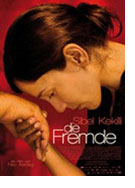

Opening 11 Mar 2010
Directed by:
Feo Aladag
Writing credits:
Feo Aladag
Principal actors:
Sibel Kekilli, Nizam Schiller, Derya Alabora, Settar Tanriogen, Serhad Can
According to the United Nations approximately five thousand women die each year, the victims of honor killings (Ehrenmorde). In 2009 there were twenty-five such deaths in Germany. Two highly publicized victims in Hamburg were Gülsüm in 2009 and Morsal in 2008. Both died at the hands of their brothers, although the crime was condoned by the extended family. Director Feo Aladag takes on this topic in her first feature film.
Turkish Umay turns her back on married life in Istanbul and returns to her parents in Berlin. They are pleasantly surprised to welcome her and her small son Cem into their apartment where they live with their sons Mehmet and Acar and their second daughter Rana. The surprise turns to consternation and the welcome to rejection when they realize that Umay wishes to stay with them and lead the independent life of a Western woman. While she expects them not only to condone her decision but to give love and support, they, with heavy hearts, cannot. She leaves after learning of a plot to send Cem to his father in Turkey. She moves from house to house, gets a job, and enrolls in evening classes. Each step takes her away from those she loves. Still she attempts to keep up the family ties, especially for the sake of little Cem. Each family member suffers his own private despair. The father travels to Turkey for advice from an elder; the wedding of sister Rana is almost cancelled due to having lost face; Mehmet has a masculinity crisis; young Acar is caught in the middle; their mother also makes a choice.
In this excellent film there are no bad
people, but only people who try to find solutions within their means; the
situation and the outcome are tragedies for everyone. To my own surprise I left
the cinema thinking that possibly Umay was selfish in her expectations of the
options available to her family where the men were possibly even more
devastated than the women. Feo Aladag directed, wrote the script, and
co-produced with her husband Züli Aladag. She enables us to bond with
each character, partly due to the Turkish language (with German subtitles) and
mostly due to the wonderful cast of German and Turkish and German-Turkish
actors. Each scene is perfect and brings the action one step further (camera: Judith
Kaufmann). How could Hamburg director Fatih Akin have known when he discovered Sibel Kekilli
(off the street for his 2004 film Gegen die Wand) that she would develop
into such a fine actress to play Umay? Aladag said that this topic, which she
has researched over fifteen years, is not a Turkish, but a world-wide problem.
It showed at the 2010 Berlinale to an international audience where it won the
Label European Cinema prize. In Germany, she hopes that there will be a Turkish audience as well, although
she stresses that the film does not criticize any particular culture nor
especially any religion, as this problem existed long before any modern-day religions or cultures. (Becky Tan)